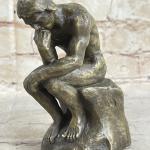— Matthew R. Crawford —
Is it possible for a physicist to instruct a theologian on the topic of God? This is the question that has been rolling around in my mind since I read Walter Isaacson’s new biography of Einstein while on vacation (New York: Simon and Schuster, 2007). Physics and biographies are two topics that have long interested me. How could one not be enamored by the forgetful scientist with the disheveled hair? I found the biography to be a stimulating and enjoyable read. Einstein is of course most well-known for the equation E=mc2 (energy equals mass times the speed of light squared), a consequence of his theory of special relativity. However, perhaps Einstein’s greatest contribution to physics was the general theory of relativity in which he gave an explanation for gravity that far surpassed what was known at the time. Isaacson says that the theory “was a whole new way of regarding reality” (223).
The reason I mention the general theory of relativity on a blog like this is to note that what drove Einstein to his scientific conclusions was a conviction that nature displayed a beauty that was discernible, and that a characteristic feature of this beauty was simplicity. One of Einstein’s contemporary physicists, Max Planck, even wrote that in Einstein’s general theory of relativity “the intimate union between the beautiful, the true and the real has again been proved” (260). Similar transcendental statements about beauty and simplicity in scientific theories are echoed in the more recent work of Brian Greene, a prominent physicist working on the much-hyped string theory (note the title of his book: The Elegant Universe). For the Christian, the significance of this concept of beauty is two-fold.
First, it demonstrates that scientists are far from the objective fact-gatherers that they are popularly held to be. Scientists have presuppositions just as we all do. That is, they’re assuming that something is true (nature exhibits simplicity) and then acting on the basis of that belief (seeking out the most elegant mathematical solutions). Indeed, Einstein’s concept of beauty drove him to spend the last decades of his life in an unsuccessful search for a unified field theory. Today, large expenditures of money and brain power are spent on research that is at least in part driven by the presupposition that the universe is elegant in its rationality. For this reason, Christians ought not be bothered when they are castigated by empiricists for relying upon faith. Indeed, the scientist has his own kind of faith. In other words, the way of knowing for a scientist and the way of knowing for the Christian may have some important similarities.
The second significance of Einstein’s concept of beauty is that it resonates with the God of the Christian faith. Einstein’s own journey of faith never led him to embrace Christianity. After a few brief teenage years as a devoutly practicing Jew, Einstein went on to hold a deistic concept of God. He stood in awe at the beauty and complexity of the cosmos, but could not bring himself to accept the idea of a God who meddles in human history. As Christians we must affirm that Einstein saw correctly that the beauty of the universe reflects the beauty of something or Someone beyond the universe. If God had remained silent, we could say no more than Einstein said – that the vast darkness of the universe presents suggestions of a transcendent beauty. However, the uniqueness of the Christian story is that it asserts that this God has not remained silent. He has spoken into the darkness and revealed his beauty in even more striking colors than can be found in mere mathematical equations. The beauty of God is seen most clearly in the Christian narrative of a God who did meddle in history by doing the most unimaginable thing – becoming a human and redeeming mankind. It is a disgrace that more Christians who have the gift of the word and Spirit do not stand in awe of the beauty of God as did Einstein who only saw through a glass darkly. May we say with David, “One thing have I asked of the Lord . . . to gaze upon the beauty of the Lord and to inquire in his temple” (Psalm 27:4).















